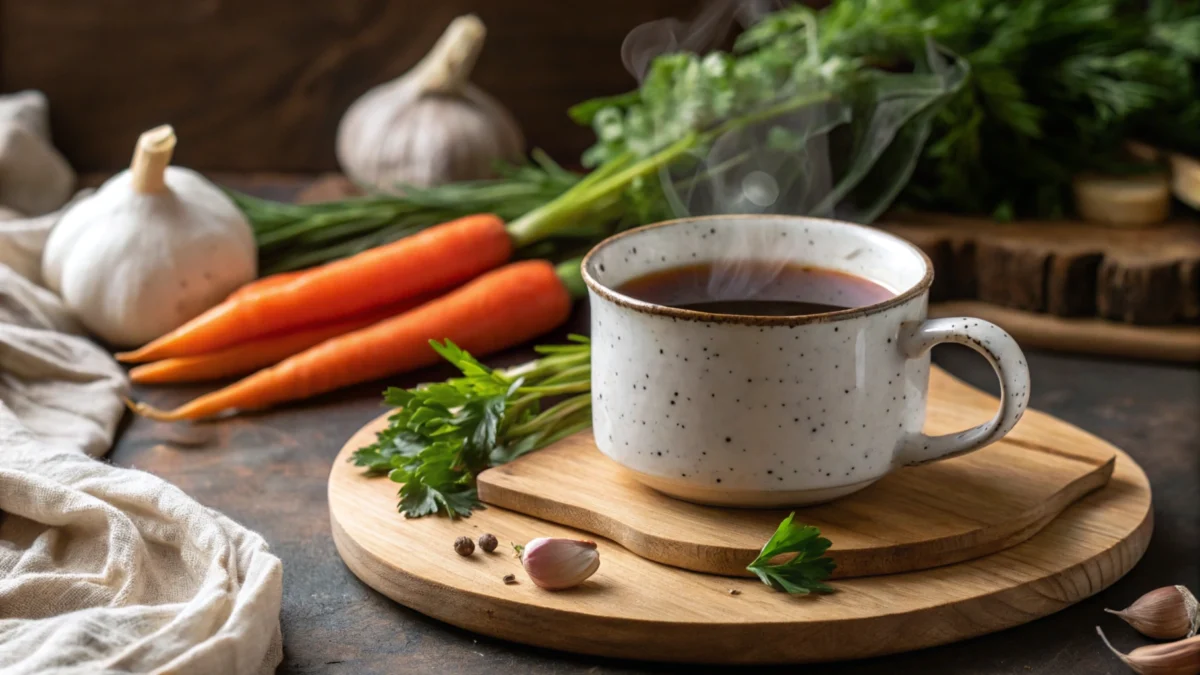Introduction to Why do I feel weird after drinking bone broth?
Bone broth has surged in popularity as a superfood packed with collagen, amino acids, and minerals. Yet, not everyone experiences the warm embrace of its touted benefits. Some find themselves grappling with odd sensations—dizziness, brain fog, or stomach discomfort. What’s going on?
In this article, we’ll delve into why bone broth might not always sit well. From digestive quirks to allergic reactions and even psychological factors, we’ll break down the reasons you might feel strange after sipping this nutrient-rich elixir. Plus, we’ll offer practical tips to enjoy bone broth safely and comfortably.

Let’s start by understanding what bone broth is and why it has become a health trend.
What Is Bone Broth?
Bone broth is a savory liquid made by simmering animal bones, often with vegetables, herbs, and spices. Unlike traditional broths, it’s cooked for hours—sometimes days—to extract nutrients like collagen, gelatin, and minerals. This lengthy process yields a nutrient-dense liquid hailed for its potential health benefits.
Nutritional Composition of Bone Broth

At its core, bone broth is a powerhouse of nutrients:
- Collagen and gelatin: Promote joint health and skin elasticity.
- Amino acids (like glycine and proline): Support gut lining and muscle repair.
- Minerals (calcium, magnesium, and phosphorus): Essential for bone strength and metabolic functions.
While these nutrients are undeniably beneficial, their concentrated presence can occasionally trigger adverse reactions in certain individuals.
The Popularity and Health Claims Surrounding Bone Broth
Bone broth enthusiasts claim it:
- Boosts gut health by repairing the intestinal lining.
- Enhances immune function through its nutrient profile.
- Aids in detoxification thanks to its amino acid content.
However, not everyone’s experience aligns with these glowing endorsements. If you’re one of the many asking, “Why do I feel weird after drinking bone broth?”, the answer may lie in how your body responds to its unique composition.
Now that we’ve laid the groundwork, let’s dive into the possible reasons behind these odd reactions. Stay tuned for Part 2, where we explore digestive sensitivities, allergies, and more.
Potential Reasons You Feel Weird After Drinking Bone Broth
Digestive Sensitivities and Bone Broth
For some, bone broth doesn’t sit well with the gut. Why? It’s often packed with histamines and other compounds that can irritate sensitive digestive systems.
- High histamine content and its effects: Bone broth, especially when simmered for long periods, contains elevated histamines. These can trigger reactions like headaches, bloating, or skin rashes in individuals with histamine intolerance.
- Potential reactions to gelatin or collagen: While collagen and gelatin are praised for their benefits, they can overwhelm a sensitive digestive system, leading to nausea or an upset stomach.
If you’ve noticed that drinking bone broth feels more like a challenge than a health boost, histamines or the concentration of these proteins could be the culprit.
Allergic Reactions to Ingredients in Bone Broth
Bone broth often contains an array of ingredients beyond bones—vegetables, spices, and herbs—which can sometimes cause allergic reactions.
- Common allergens in bone broth: Ingredients like onions, garlic, or spices may trigger food sensitivities. Additionally, animal-derived compounds, such as collagen, could provoke unexpected immune responses.
- Symptoms of an allergic response: Feeling weird might manifest as skin irritation, difficulty breathing, or gastrointestinal discomfort. If symptoms persist, it’s essential to consult with a healthcare provider.
Detoxification Symptoms from Bone Broth
Ah, the infamous detox symptoms. Bone broth advocates often attribute discomfort to the body “detoxing,” but this concept can be misleading.
- Detox myths vs. reality: There’s little scientific evidence to support the idea that bone broth triggers detoxification. Instead, reactions like fatigue or brain fog could be a sign of your body adjusting—or reacting poorly.
- Why your body might react: Bone broth is nutrient-rich, and sudden intake may overwhelm systems unaccustomed to its density, leading to symptoms mistaken for detoxification.
Bone Broth Quality and Preparation Issues
The quality and preparation of bone broth can significantly impact how your body reacts.
- Poor quality ingredients and contamination: Bones from animals raised with antibiotics or exposed to toxins might introduce unwanted substances into the broth. These can provoke reactions that make you feel off.
- Effects of improper preparation or storage: If bone broth isn’t cooked or stored correctly, it can harbor bacteria or degrade in quality, leading to gastrointestinal upset.
When it comes to bone broth, the phrase “one size fits all” doesn’t apply. Each person’s reaction can depend on factors like ingredient quality, preparation methods, and individual sensitivities. Identifying the root cause is key to making this superfood work for you.
Exploring the Psychological Impact of Drinking Bone Broth
Placebo Effect and Expectation
It’s no secret that what we expect from a food or drink can influence how we feel after consuming it. Bone broth, with its reputation as a health elixir, may amplify expectations—and the resulting experience.
- The power of expectation: If you’ve heard glowing reviews about bone broth’s benefits but end up feeling strange, disappointment or anxiety could magnify your perception of discomfort.
- Positive and negative placebo effects: On one hand, you might feel better simply because you believe the broth is good for you. On the flip side, if you’ve heard warnings or had prior negative experiences, your mind might trick your body into reacting poorly.
Psychosomatic Reactions to New Diet Habits
Trying new dietary trends, especially ones as hyped as bone broth, can sometimes create psychosomatic responses. This means your mental state influences physical sensations.
- Stress about trying something new: If you’re worried about how bone broth might affect you, that stress could manifest physically. Nausea, headaches, or fatigue might not be from the broth itself but from your body’s reaction to your mindset.
- Overanalyzing bodily responses: Sometimes, when trying a new food, we pay extra attention to how we feel afterward. Minor sensations—like a slight stomach gurgle—can suddenly feel amplified, leading us to believe something is wrong.
The Role of Dietary Habits and Lifestyle
Your overall diet and lifestyle can also influence how your body reacts to bone broth.
- Drinking bone broth on an empty stomach: For some, consuming a nutrient-dense broth without other food can lead to lightheadedness or discomfort.
- Changes in daily routine: Adding bone broth to your diet might disrupt your typical eating patterns, causing temporary adjustments in how your body processes food.
The mind-body connection is powerful, and it’s entirely possible that feeling “weird” after drinking bone broth isn’t just about the broth—it’s also about your expectations, stress levels, and habits.
Scientific Perspectives on Bone Broth Side Effects

Studies on Bone Broth and Gut Health
Bone broth’s link to gut health has been a hot topic, with both supporters and skeptics weighing in. While many claim that it aids in repairing the gut lining, scientific evidence is still evolving.
- Does bone broth support gut health? Some studies suggest that compounds like gelatin and collagen may help maintain a healthy intestinal barrier. However, these benefits are often anecdotal, and not everyone reacts the same way.
- Potential for negative gut reactions: For individuals with conditions like histamine intolerance or irritable bowel syndrome (IBS), bone broth may trigger symptoms like bloating or stomach upset.
Does Bone Broth Really Cause Detox Symptoms?
One of the most debated topics around bone broth is its supposed role in detoxification. While many proponents argue it “cleanses the body,” the science tells a different story.
- Myth vs. reality: Your body already has built-in detox systems—your liver and kidneys. Bone broth isn’t a magical detox solution. In fact, feelings of fatigue or nausea after drinking it could stem from nutrient overload rather than toxins being released.
- Nutrient overload symptoms: High concentrations of amino acids, particularly glycine, might temporarily affect some people’s digestion or mood.
Contradicting Views in the Health Community
The health community remains divided on whether bone broth is a superfood or just another trend.
- Proponents’ perspective: Advocates highlight its amino acids and minerals, claiming these support everything from skin health to joint function.
- Skeptics’ take: Critics point out that while bone broth is nutrient-rich, the amounts of these nutrients might not be significant enough to make a dramatic difference in health.
Suggestion for Further Reading
For a detailed recipe on making bone broth at home, check out this chicken bone broth recipe on Makouri Recipes. It’s a great guide for ensuring you use high-quality ingredients and proper preparation methods.
Science sheds light on both the benefits and potential drawbacks of bone broth. While it has nutritional merits, individual reactions vary widely, and detox claims remain largely unfounded. In the next part, we’ll address common questions about bone broth and its effects.
FAQs About Bone Broth
What Are the Side Effects of Drinking Bone Broth?
Many people experience mild side effects when drinking bone broth, especially if they’re new to it.
- Common side effects: These include bloating, gas, or even light nausea. Such reactions often occur when your digestive system isn’t accustomed to the concentrated nutrients.
- Severe reactions: While rare, symptoms like severe stomach pain or allergic responses might suggest an intolerance or contamination in the broth.
Why Do I Feel Dizzy After Drinking Bone Broth?
Dizziness can be an unexpected reaction, but it’s not unheard of.
- Electrolyte imbalance: Bone broth is rich in minerals like sodium, potassium, and magnesium. For some, these nutrients might temporarily disrupt electrolyte balance, leading to dizziness.
- Dehydration: Drinking bone broth alone without sufficient water intake might exacerbate dehydration, causing lightheadedness.
Can You Have a Reaction to Bone Broth?
Yes, some individuals may react to bone broth due to its ingredients or preparation.
- Histamine sensitivity: Long-simmered bone broth is high in histamines, which can trigger headaches, fatigue, or skin flushing in those who are sensitive.
- Allergic components: Ingredients like garlic, onion, or certain spices might provoke an allergic response.
Why Does Bone Broth Give Me Brain Fog?
Brain fog is another complaint from some bone broth drinkers.
- Amino acid effects: Glycine, an amino acid in bone broth, can have calming effects. However, for some, it might contribute to feelings of sluggishness or mental fog.
- Immune or inflammatory response: If your body reacts negatively to bone broth, mild inflammation could temporarily affect mental clarity.
If you’ve been wondering, “Why do I feel weird after drinking bone broth?”, the answers lie in your unique physiology and the preparation of the broth. Understanding your body’s reactions can help you enjoy bone broth safely and reap its benefits.
Practical Tips for Safe Bone Broth Consumption
Choosing High-Quality Bone Broth
The first step to enjoying bone broth without unpleasant side effects is selecting or making a high-quality product.
- Opt for organic and grass-fed sources: Bones from healthy animals are less likely to contain harmful residues like antibiotics or hormones, reducing the risk of adverse reactions.
- Watch for additives: Many store-bought bone broths contain added preservatives or flavorings that could irritate sensitive stomachs.
- Homemade is best: Making your own bone broth allows you to control ingredients and cooking time. Check out this detailed chicken bone broth recipe for a step-by-step guide.
How to Introduce Bone Broth Gradually
If you’re new to bone broth, easing into it can help your body adapt to its nutrient density.
- Start small: Begin with half a cup per day and gradually increase the amount over a week.
- Dilute if needed: If the taste or concentration feels overwhelming, dilute the broth with water or mix it into soups.
- Pair with meals: Drinking bone broth on an empty stomach might intensify its effects. Try pairing it with a small meal to minimize potential discomfort.
Alternatives to Bone Broth for Sensitive Individuals
If bone broth consistently makes you feel unwell, there are other ways to obtain similar nutrients.
- Collagen supplements: These provide the benefits of collagen without histamine concerns.
- Plant-based broths: While they lack collagen, they’re gentler on the stomach and still rich in minerals.
- Gelatin-based recipes: Explore recipes using gelatin powder, which can offer gut health benefits in a more controlled form.
By choosing high-quality ingredients, starting small, and exploring alternatives, you can make bone broth a positive addition to your diet.
Conclusion: Why Do I Feel Weird After Drinking Bone Broth?
Bone broth can be a nutritional powerhouse, but it’s not a one-size-fits-all remedy. Whether your discomfort stems from histamine sensitivity, digestive reactions, or psychological factors, understanding your body’s unique response is key. We’ve covered everything from the science behind these reactions to practical tips for safe consumption.
If you’ve been asking, “Why do I feel weird after drinking bone broth?”, remember that your experience might differ from others. By choosing high-quality products, introducing them gradually, and listening to your body, you can make the most of bone broth without unnecessary discomfort.
For more helpful recipes and insights into healthy eating, check out this chicken bone broth recipe or explore the other amazing recipes on Makouri Recipes.
Final Note
We hope this article has answered your questions and provided actionable steps to make bone broth work for you. If you’re interested in further exploring the world of nutrition, stick around for more tips, recipes, and wellness advice. Happy cooking and sipping!




1 thought on “Why Do I Feel Dizzy After Drinking Bone Broth?”